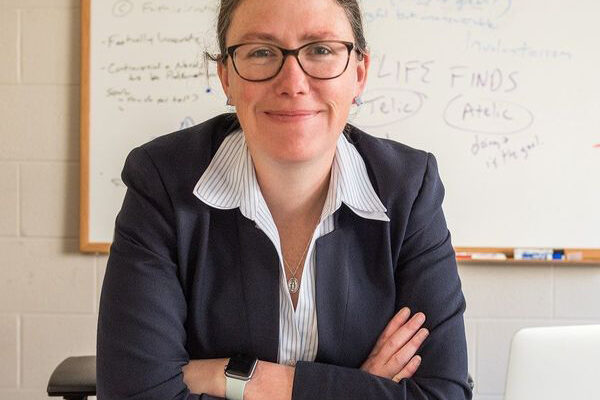Sullivan Secures $10 Million Grant to Lead “Love Ethic” Initiative at Notre Dame.
At the University of Notre Dame, a monumental initiative is underway, driven by the vision and leadership of Meghan Sullivan, a distinguished professor of philosophy and a champion of human flourishing. Sullivan has secured a transformative \$10 million grant to launch and lead an ambitious project centered on what she calls a “Love Ethic.” The project is not merely academic in nature; it is rooted in an expansive, deeply human vision that draws from philosophical, theological, and practical traditions to reshape how we approach education, relationships, public discourse, and social justice. In an era marked by polarization, alienation, and cynicism, the “Love Ethic” project aims to offer a compelling alternative — one grounded in compassion, commitment, and the moral and civic responsibilities we share with one another.
The grant, awarded by the John Templeton Foundation, will fund a multi-year endeavor titled “The Love Ethic: Flourishing Through Commitment,” and will span interdisciplinary research, curriculum development, and public engagement. This initiative seeks to redefine what it means to live a good life by focusing on love not as a fleeting emotion, but as a moral virtue and philosophical framework. Sullivan and her collaborators aim to show that love — in its many forms — can serve as a serious and rigorous foundation for individual flourishing and collective well-being.
At the heart of Sullivan’s effort is a belief that higher education should do more than equip students with technical skills and professional competencies. Instead, she argues, universities have a responsibility to help students wrestle with life’s biggest questions: What does it mean to live well? What obligations do we have to others? What does commitment to another person, a cause, or a community actually look like in practice? These questions are far from abstract. For Sullivan, they are urgent and deeply practical, and she is convinced that a renewed emphasis on love and commitment can provide the clarity and courage needed to answer them.
Sullivan is already well known for her work on these themes. She co-authored “The Good Life Method,” a book that reflects on her experience teaching Notre Dame’s wildly popular “God and the Good Life” course, which introduces students to philosophical ideas through the lens of everyday decision-making. In that course, students grapple with concepts like moral responsibility, authenticity, suffering, and purpose. But now, with the resources and scope of the new project, Sullivan and her team plan to go much further. They aim to build a scholarly infrastructure for the study of love and commitment across disciplines, engaging philosophers, psychologists, theologians, educators, and civic leaders in a common pursuit.
The grant will fund new faculty research, postdoctoral fellowships, visiting scholar residencies, public events, and the development of educational materials that can be shared across institutions and communities. One of the key goals is to create a curricular model that can be adopted not only at Notre Dame but across a wide range of colleges and universities. These courses will focus on helping students articulate their values, navigate moral complexity, and understand how commitment to people, institutions, and ideals can shape their lives in profound and lasting ways.
Another important element of the project will involve community engagement. Sullivan is committed to ensuring that the insights and resources generated through the Love Ethic initiative are not confined to academia. To that end, the project will partner with faith communities, civic organizations, and public schools to bring discussions of love, commitment, and moral flourishing into everyday life. The aim is to foster a culture in which love is not seen as naive or sentimental, but as a robust and courageous response to the challenges we face as individuals and as a society.
This approach is particularly resonant at Notre Dame, a Catholic research university that has long emphasized the integration of faith, reason, and service. For Sullivan, the Love Ethic project aligns naturally with the university’s mission to cultivate both the mind and the heart. She believes that intellectual formation and moral formation must go hand in hand — and that love, rightly understood, can be the thread that weaves together critical thinking, ethical action, and spiritual purpose.
In developing the project, Sullivan draws inspiration from thinkers like bell hooks, who wrote powerfully about the transformative potential of a love ethic in personal relationships, education, and activism. She also engages with classical and religious traditions that explore love as agape — a self-giving, unconditional form of love that seeks the good of the other. The project is thus both deeply contemporary and richly rooted in enduring traditions of thought.
The Love Ethic project comes at a time when many people — especially young people — are struggling to make sense of a fragmented and often disheartening world. Rising rates of anxiety, loneliness, and despair have prompted urgent questions about the role of community, meaning, and hope in modern life. Sullivan believes that love — understood as a disciplined, ethical commitment — can offer an anchor amid uncertainty. She argues that learning how to love well is not peripheral to education; it is essential.
Importantly, the project also seeks to redefine the public conversation around love. Too often, love is dismissed as the domain of romance or sentimentality. But Sullivan wants to reframe it as a form of moral agency — something that requires discernment, courage, and sacrifice. Whether in parenting, friendship, marriage, citizenship, or leadership, love demands real work. It involves habits of attention, empathy, accountability, and perseverance. And these habits, she insists, can be taught, practiced, and refined over time.
The grant’s size and scope underscore the significance of Sullivan’s vision. A \$10 million investment represents a bold bet on the power of humanistic inquiry to address some of society’s most pressing needs. It also reflects a growing recognition that the humanities — far from being a luxury or an afterthought — are vital to the future of democratic life. By focusing on love and commitment, Sullivan is helping to build a bridge between the academy and the broader world, reminding us that philosophy is not just about arguments but about life itself.
The impact of the Love Ethic project will be measured not only by publications or classroom enrollments, but by the lives it touches and the conversations it inspires. Sullivan hopes that students will emerge from the program with a deeper sense of vocation, a clearer understanding of their responsibilities to others, and the moral imagination to envision new possibilities for connection and care. She also hopes that educators, policymakers, and community leaders will find in the project a source of insight and inspiration for their own work.
In this way, the project challenges the prevailing assumption that love is too soft or subjective to serve as a foundation for serious thought or action. On the contrary, Sullivan and her collaborators contend that love is one of the most demanding — and therefore one of the most powerful — moral frameworks we have. It calls us out of self-absorption and into relationship. It compels us to take others seriously, to bear one another’s burdens, and to build communities of trust and solidarity. And it offers a vision of human flourishing that is both deeply personal and inherently social.
The Love Ethic project is still in its early stages, but its promise is already evident. With strong institutional support, an interdisciplinary team of scholars, and a clear moral vision, Sullivan is poised to lead a movement that could reshape not only how we think about education, but how we think about what it means to live well. At a time when many people are searching for purpose, connection, and meaning, this work could not be more timely — or more needed.
As Sullivan and her team begin this journey, they carry with them a conviction that love is not only possible in the modern world, but essential. In the face of cynicism and despair, the Love Ethic project stands as a bold affirmation of our capacity for goodness, our responsibility to one another, and our shared hope for a better, more compassionate future.



